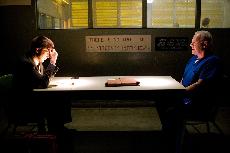
Everything has a flaw if scrutinized enough, and if there’s anyone who can find it, it’s Anthony Hopkins as a psychopathic murderer. The man who has made a career of playing creepy old killers returns again in Fracture, a film that might as well be another Silence of the Lambs sequel.
Fracture’s premise is a tug-of-war game between a murderer and a prosecutor. It’s a slow-moving film with clunky, deliberate sequences that move back and forth between the courtroom and the crime scene investigation, interspersed with a loveless romance. The film is meant to be a murder mystery and a thriller with some occasional suspense, but in truth, there’s very little mystery.
We watch early in the film as Ted Crawford (Hopkins, All the King’s Men) stalks his cheating wife and then kills her in cold blood with a pistol in their home. When the cops arrive on the scene, not only is her bleeding body still on the floor, but he’s still there too, and quickly admits to the murder. The magic is not in the crime, but in watching him slowly but surely get away with it.
If Crawford’s character is like Hannibal Lecter, then Ryan Gosling (Half Nelson) as Willy Beachum is the obvious Jodie Foster equivalent. As an up-and-coming prosecutor with a flawless record at the District Attorney’s Office, Beachum was supposed to get hired into a prestigious law firm, but begrudgingly takes Crawford’s case as his last with the office. Although he is intrigued by Crawford’s elusiveness, Beachum already has one foot out the door, and only half-heartedly begins following the alleged murderer through a maze of unforeseen roadblocks.
Like Clarice Starling from the Hannibal series, Beachum follows Crawford into great danger, always pushed by his malignant, yet alluring, threats. With a career move right around the corner, Beachum is caught off-guard by Crawford’s case, which seems transparent in the beginning but swiftly becomes murkier than expected.
Meanwhile, Beachum’s personal life is pushed to the edge. His love interest is one of his future supervisors within the prestigious law firm, creating a sticky, possibly horribly unethical situation. And when Beachum becomes obsessed with the Crawford case, he puts his career and love life in great jeopardy. Soon, Beachum finds himself in an ironic position: His last, and seemingly most winnable case with the D.A.’s office, is actually the one that may ruin his career. We watch as Beachum transitions from a confident, well-spoken lawyer to a sleepless, mumbling mess, all thanks to Gosling’s smooth acting skills.
Of course, Hopkins is disgustingly comfortable in his role as a killer who, while not a cannibal, seems to have the heart of one. He’s manipulative and exacting, which is supposed to explain his career in mathematics. At one point, Hopkins tells a story about how when he was young, he would go through all the eggs on his farm with a microscope and find a fracture in every single one of them. Everything has a flaw, he explains, and when you find that small crack, you can exploit it.
This metaphor defines the movie, as Fracture is at its most enjoyable when the audience observes the tug-of-war power battle between Beachum and Crawford: Just as one pulls the rope hard, the other responds by pulling harder.
But as enjoyable as it is to watch these characters interact, Fracture’s plot would work better as an episode of CSI rather than as a whole movie – there is simply not enough story to fill up the whole film. Although there are twists and turns, and the acting is impressive, the film doesn’t feel like it goes anywhere until the very end – while the film concentrates on Gosling’s character, it is Hopkins who is far more intriguing. And while The Silence of the Lambs balanced character analysis with a fulfilling sense of suspense, Fracture just can’t compare.
Contact reporter Adam Z. Winer at awiner42@umd.edu.



